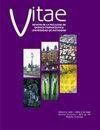住院患者药物治疗随访方法学的验证
Q3 Pharmacology, Toxicology and Pharmaceutics
引用次数: 0
摘要
背景:药物治疗随访是药剂师对患者药物相关问题承担责任的一种实践。其目标是取得积极的临床结果。进行药物治疗随访的方法主要集中在门诊患者身上。目的:本研究的目的是提出并验证一种住院药物治疗随访方法。方法:进行系统评价。这包括对包含1998 - 2008年期间以英语或西班牙语发表的研究的数据库的全面搜索,旨在提高住院患者药物治疗随访的准确信息的传递。在与临床专家协商后确定了用于进行搜索的关键术语,包括:药物治疗随访方法、药物治疗随访、药物治疗问题和验证。拟定了一个比较表,以区分和评价所提议的每一种方法的优点。收集到的信息允许提出住院患者药物治疗随访的一般步骤序列。为了验证该方法,对32名随机选择的患者进行了描述性研究,并由两名药剂师独立随访,以评估该过程的可重复性。结果:药学服务实践:临床医师指南,由Cipolle & Strand提出。应用治疗学:药物的临床使用,DÁDER方法和激光程序,被选中。发现并解决了79个药物治疗问题,其中用药必要性错误发生率最高(46.6%),其次是有效性(24.5%)和安全性(28.9%)。研究人员在dtp鉴定和分辨率方面的一致程度使用kappa系数进行量化,显示出高一致性(90% CI)。Fisher的精确测试确定dtp与随访时间、药物数量、住院时间和以前的住院情况有关。结论:该方法可以识别、预防和解决dtp。它被证明是可复制的,并且在应用程序之间具有高度的一致性。本文章由计算机程序翻译,如有差异,请以英文原文为准。
VALIDATION OF A METHODOLOGY FOR INPATIENT PHARMACOTHERAPY FOLLOW-UP
Background: Pharmacotherapy follow-up is a practice in which the pharmacist assumes responsibility for the patient’s drug-related Problems. Its goal is to achieve positive clinical outcomes. Methods to perform pharmacotherapy follow-up have centered principally on ambulatory patients. Objective: The purpose of this study is to propose and validate a methodology for inpatient pharmacotherapy follow-up. Methods: A systematic review was performed. This consisted in a comprehensive search of databases containing studies published in English or Spanish during 1998 - 2008, and that sought to improve the transfer of accurate information about Pharmacotherapy follow-up in inpatients. The key terms used to conduct the search were identified in consultation with clinical experts and included: Pharmacotherapy follow-up methods, pharmacotherapy follow-up, drug therapy problems, and validation. A comparative table was elaborated to differentiate and evaluate the advantages of each of the proposed methodologies. The information gathered allowed to propose a sequence of general steps for inpatient Pharmacotherapy follow-up. To validate the methodology, a descriptive study was carried out with 32 randomly selected patients and was independently followed up by two pharmacists to assess the reproducibility of the process. Results: Pharmaceutical Care Practice: The Clinician’s Guide, proposed by Cipolle & Strand. Applied Therapeutics: The Clinical Use of Drugs, the DÁDER method, and the IASER program, were selected. 79 drug therapy problems (DTPs) were identified and resolved, where errors in necessity of medication had the highest incidence (46.6%), followed by effectiveness (24.5%) and safety (28.9%). The degree of agreement among researchers in the identification and resolution of DTPs was quantified using the kappa coefficient, showing a high concordance (90% CI). The Fisher’s exact test determined that DTPs are related to the duration of the follow up, number of medications, length of the stay and previous hospitalizations. Conclusions: The methodology allows identifying, preventing and resolving DTPs. It proved to be reproducible and have a high degree of concordance between applications.
求助全文
通过发布文献求助,成功后即可免费获取论文全文。
去求助
来源期刊

Vitae
PHARMACOLOGY & PHARMACY-
CiteScore
1.20
自引率
0.00%
发文量
0
审稿时长
>12 weeks
期刊介绍:
The journal VITAE is the four-monthly official publication of the School of Pharmaceutical and Food Sciences, and its mission is the diffusion of the scientific and investigative knowledge in the various fields of pharmaceutical and food research, and their related industries. The Journal VITAE is an open-access journal that publishes original and unpublished manuscripts, which are selected by the Editorial Board and then peer-reviewed. The editorial pages express the opinion of the Faculty regarding the various topics of interest. The judgments, opinions, and points of view expressed in the published articles are the responsibility of their authors.
 求助内容:
求助内容: 应助结果提醒方式:
应助结果提醒方式:


